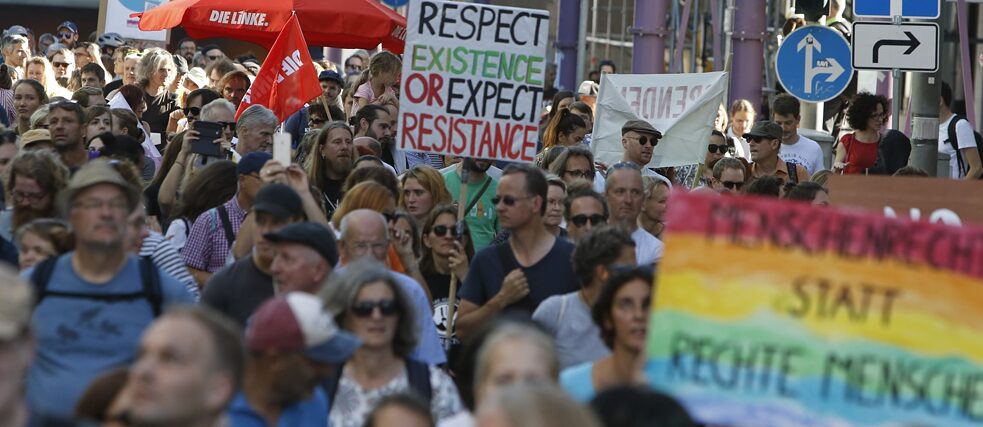Frankly … integrated
Immigration or emigration

Photo (detail): Michael Debets / picture alliance / Pacific Press Agency
Although moving to a foreign country may be an exciting experience, opening doors to new cultures and opportunities, it is not without ups and downs and unexpected turns. Dominic Otiang’a describes his encounter with the label “foreigner”.
By Dominic Otiang’a
Migration is a never-ending topic in Germany. It is therefore inconclusive to write about the happenings in Germany without touching on this topic. So, let me express myself as a person that is always a subject of discussion on every television channel and Newspaper.
Four years ago, my good neighbour posed a question to me: "Why did you people decide to be foreigners?" The question surprised me mainly because he was an Italian citizen living in Germany. He insisted that as a European, he wasn't a foreigner and never felt so. "Even my daughter in London feels at home there. We are Europeans, you know," he added.
Residence: Legal fact or social truth?
In a 'woke culture', such people are called out as racist bigots and condemned to silence in the smallest corner of their world. But ‘woke culture’ hardly promotes understanding. I tried to debate with him for a while by first accepting the idea that his European citizenship made him feel local in Germany even without any knowledge of the German language.But I struggled to drive my second point that the idea that one is a member of a society in which they reside is an undeniable fact, not a legal truth but a social fact. The law considers alternative circumstances based on the will of the majority. And what else can be more potent than the Law? Haven't laws turned biological offspring into illegitimate children in some jurisdictions in the name of maintaining order and morality in the society?
Social Attitudes Change
My point to this middle-aged man was that social facts are immutable. Legal circumstances change as soon as the attitude of the majority of the people changes. I also told him that in my home country, there is a city full of Italian immigrants, and immigration is not a topic of national concern there. To my surprise, he was aware of the Kenyan Italian town. He had visited his Italian relatives there before. Since then, he greets me in Swahili “Jambo Rafiki!” (Hallo, my friend!) whenever we meet.Four years later, upon the conclusion of Brexit, I asked him: “Now that the attitude of the majority of Britons towards Europe has changed, wouldn't that make your daughter a foreigner in Britain? Does she still feel at home in Britain?” He uttered unprintable words about Britain.
Who is heard in social discourse?
There was a photo doing the rounds some years ago on social media: A picture of dozens of men in a meeting somewhere in the Middle East with the caption “Women Conference.” It may have been fake news, but in my view, it was a piece of art. A powerful thought-provoking piece of art depicting a powerful and legally-advantaged section of the society converging to discuss the plight of the legally-disadvantaged “others” in their community in the total absence of the people in question; neither their faces nor their voices would be seen or heard. Now that's funny, right? But is that any different from the discussions on immigrants, refugees, aliens, or whatever names we prescribe for those other legally-disadvantaged folks in our societies?After watching a news item on immigration, you will most likely hear the German word “Personalmangel” in the next segment, which would normally highlight the shortage of workforce. There is a shortage of staff in almost every sector, be it from the industrial workers, the health sector, the transport, military, or even businesses and institutions offering apprenticeship positions. Besides, Focus Magazine Online reported in January this year that about 180,000 Germans emigrate each year and only 130,000 travel back. The situation is worse in the southern European states.
"We will make it!"
These statistics and the ongoing debate remind me of a bus ride through the industrial area of Nairobi. A passenger calls a second passenger close to the window by any name: “Hey, Frontex! Open the window. Smells bad in here!”“The stench is from the industries here. It'll be worse if I open the window,” The guy close to the window responds. “No! Open it to let out the stench!”
Under pressure to act, the driver looks at them with her decades of experience and says, “We will make it!“
"Frankly ..."
On an alternating basis each week, our “Frankly …” column series is written by Dominic Otiang’a, Liwen Qin, Maximilian Buddenbohm und Gerasimos Bekas. Dominic Otiang'a writes about his life in Germany: what strikes him, what is strange, where did he get interesting insights?